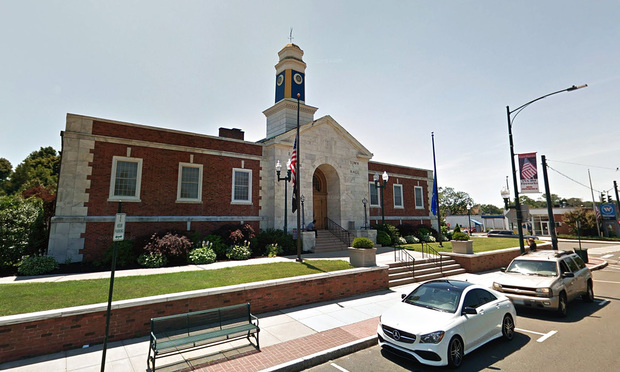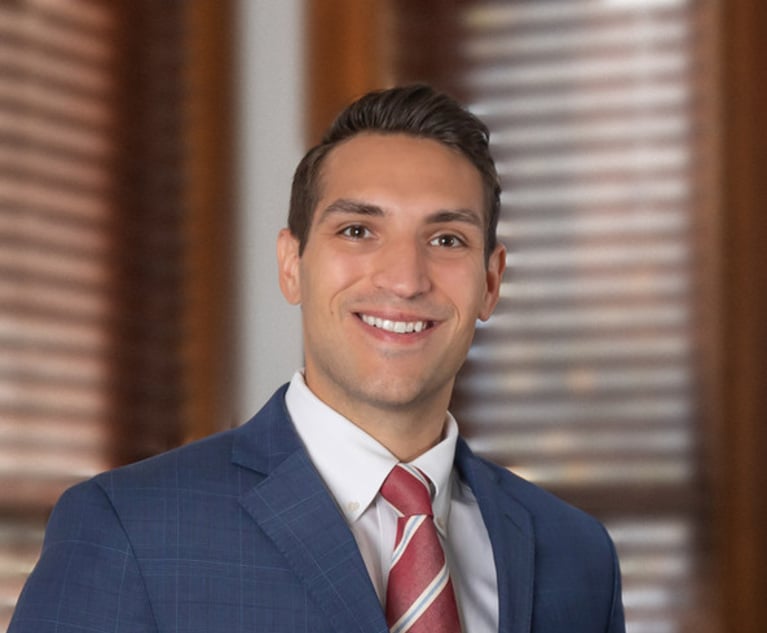Supreme Court Sides With East Haven in Government Immunity Case Involving $12M Verdict
The state's highest court has upheld a Connecticut Appellate Court ruling that reduced an eight-figure verdict to $6.2 million in a case involving government immunity and local police.
January 24, 2019 at 01:39 PM
5 minute read
 East Haven Town Hall. Photo: Google
East Haven Town Hall. Photo: Google
More than five and a half years after a jury awarded $12.2 million to a pedestrian injured after he was hit by an alleged drunken driver, the state Supreme Court has sided with the Connecticut Appellate Court in reversing the award.
Soon after the jurors returned the verdict to Thomas Ventura in his lawsuit against the town of East Haven, the judge in the case cut the award to $6.2 million. That is where it stood until Jan. 17, when the state's high court ruled 5-0 that there was clear evidence of governmental immunity shielding local police from liability in the incident. The high court's ruling means Ventura will get nothing.
Related story: Judge Cuts $12.2 Million Personal Injury Verdict in Half
At issue was a 2006 incident at a McDonald's drive-thru involving Vlad Trnka, who was accused of nearly causing a rear-end collision. Police records say Trnka was shouting at a female passenger in his truck and appeared to be intoxicated or on drugs. As it turned out, local police drove Trnka and the woman to their respective homes to sober up. The truck was never impounded even though it later emerged that Trnka was driving a 1997 construction truck with a license plate registered to a Ford truck.
More trouble followed when Trnka later retrieved his truck, but was allegedly speeding when he sideswiped Ventura, who was 18 at the time. The impact threw Ventura about 20 feet and caused him to land on his head, according to court records.
Ventura suffered a brain bleed with temporary cognitive impairment and can no longer have children because of the incident. His attorneys maintained that East Haven Police had a ministerial duty to tow the vehicle, based on the department towing rules. However, the town argued governmental immunity shielded the police.
The jury sided with Ventura, returning a multimillion-dollar verdict.
Then came the appeals.
The town urged the Appellate Court and then the Supreme Court to reject the plaintiff's argument, and to state that immunity, including the issue of ministerial duty, was a question for the court, and not for a jury. The Supreme Court agreed.
Read the full ruling
Writing for the majority, Supreme Court Associate Justice Richard Palmer ruled, “The Appellate Court correctly determined that the issue of whether the town's tow rules imposed a ministerial duty on [Officer] Jeffrey Strand to have Trnka's vehicle towed was a question of law for resolution by the court that is subject to plenary review on appeal and was not a question of fact for the jury.”
Palmer added: “The town's tow rules did not apply to town police officers, but were written solely to regulate tow-truck companies and their operators doing business with the town and, accordingly, Strand did not have a ministerial duty to have Trnka's vehicle towed.”
In a statement emailed Thursday to the Connecticut Law Tribune, Cowdery & Murphy attorney James Healy, one of Ventura's two lawyers, said he was “disappointed by the Supreme Court's decision.”
“Our hearts break for Tommy Ventura, a young man who was seriously injured through no fault of his own,” Healy said. “Although we believe that the verdict rendered by the jury was fair and appropriate, and should have been upheld on appeal, we nevertheless respect the Supreme Court's decision.”
Also representing Ventura is Joel Faxon of New Haven-based Faxon Law Group.
Aaron Bayer, one of two Wiggin & Dana attorneys representing East Haven, told the Connecticut Law Tribune Thursday the town has “nothing but sympathy” for Ventura, but said police should not be held responsible for Trnka's behavior.
“I thought it was a good thing that the Supreme Court reaffirmed the importance of governmental immunity for municipalities,” Bayer said. “We don't really want judges and juries to be second-guessing the judgment police officers have to make on the job without the benefit of hindsight. We want them [officers] to responsibly be exercising their judgment on the job without worrying about the fear of liability based on hindsight.”
Assisting Bayer on the case was Tadhg Dolley.
Trnka served one year in prison for third-degree assault. He was also sentenced in 2015 for the incident with Ventura. In that case, he was charged with evading responsibility for death or serious injury, and sentenced to 23 months in prison followed by five years of probation.
This content has been archived. It is available through our partners, LexisNexis® and Bloomberg Law.
To view this content, please continue to their sites.
Not a Lexis Subscriber?
Subscribe Now
Not a Bloomberg Law Subscriber?
Subscribe Now
NOT FOR REPRINT
© 2025 ALM Global, LLC, All Rights Reserved. Request academic re-use from www.copyright.com. All other uses, submit a request to [email protected]. For more information visit Asset & Logo Licensing.
You Might Like
View All
Apple Disputes 'Efforts to Manufacture' Imaging Sensor Claims Against iPhone 15 Technology

Patent Disputes Over SharkNinja, Dyson Products Nearing Resolution
Trending Stories
- 1'It's Not Going to Be Pretty': PayPal, Capital One Face Novel Class Actions Over 'Poaching' Commissions Owed Influencers
- 211th Circuit Rejects Trump's Emergency Request as DOJ Prepares to Release Special Counsel's Final Report
- 3Supreme Court Takes Up Challenge to ACA Task Force
- 4'Tragedy of Unspeakable Proportions:' Could Edison, DWP, Face Lawsuits Over LA Wildfires?
- 5Meta Pulls Plug on DEI Programs
Who Got The Work
Michael G. Bongiorno, Andrew Scott Dulberg and Elizabeth E. Driscoll from Wilmer Cutler Pickering Hale and Dorr have stepped in to represent Symbotic Inc., an A.I.-enabled technology platform that focuses on increasing supply chain efficiency, and other defendants in a pending shareholder derivative lawsuit. The case, filed Oct. 2 in Massachusetts District Court by the Brown Law Firm on behalf of Stephen Austen, accuses certain officers and directors of misleading investors in regard to Symbotic's potential for margin growth by failing to disclose that the company was not equipped to timely deploy its systems or manage expenses through project delays. The case, assigned to U.S. District Judge Nathaniel M. Gorton, is 1:24-cv-12522, Austen v. Cohen et al.
Who Got The Work
Edmund Polubinski and Marie Killmond of Davis Polk & Wardwell have entered appearances for data platform software development company MongoDB and other defendants in a pending shareholder derivative lawsuit. The action, filed Oct. 7 in New York Southern District Court by the Brown Law Firm, accuses the company's directors and/or officers of falsely expressing confidence in the company’s restructuring of its sales incentive plan and downplaying the severity of decreases in its upfront commitments. The case is 1:24-cv-07594, Roy v. Ittycheria et al.
Who Got The Work
Amy O. Bruchs and Kurt F. Ellison of Michael Best & Friedrich have entered appearances for Epic Systems Corp. in a pending employment discrimination lawsuit. The suit was filed Sept. 7 in Wisconsin Western District Court by Levine Eisberner LLC and Siri & Glimstad on behalf of a project manager who claims that he was wrongfully terminated after applying for a religious exemption to the defendant's COVID-19 vaccine mandate. The case, assigned to U.S. Magistrate Judge Anita Marie Boor, is 3:24-cv-00630, Secker, Nathan v. Epic Systems Corporation.
Who Got The Work
David X. Sullivan, Thomas J. Finn and Gregory A. Hall from McCarter & English have entered appearances for Sunrun Installation Services in a pending civil rights lawsuit. The complaint was filed Sept. 4 in Connecticut District Court by attorney Robert M. Berke on behalf of former employee George Edward Steins, who was arrested and charged with employing an unregistered home improvement salesperson. The complaint alleges that had Sunrun informed the Connecticut Department of Consumer Protection that the plaintiff's employment had ended in 2017 and that he no longer held Sunrun's home improvement contractor license, he would not have been hit with charges, which were dismissed in May 2024. The case, assigned to U.S. District Judge Jeffrey A. Meyer, is 3:24-cv-01423, Steins v. Sunrun, Inc. et al.
Who Got The Work
Greenberg Traurig shareholder Joshua L. Raskin has entered an appearance for boohoo.com UK Ltd. in a pending patent infringement lawsuit. The suit, filed Sept. 3 in Texas Eastern District Court by Rozier Hardt McDonough on behalf of Alto Dynamics, asserts five patents related to an online shopping platform. The case, assigned to U.S. District Judge Rodney Gilstrap, is 2:24-cv-00719, Alto Dynamics, LLC v. boohoo.com UK Limited.
Featured Firms
Law Offices of Gary Martin Hays & Associates, P.C.
(470) 294-1674
Law Offices of Mark E. Salomone
(857) 444-6468
Smith & Hassler
(713) 739-1250












